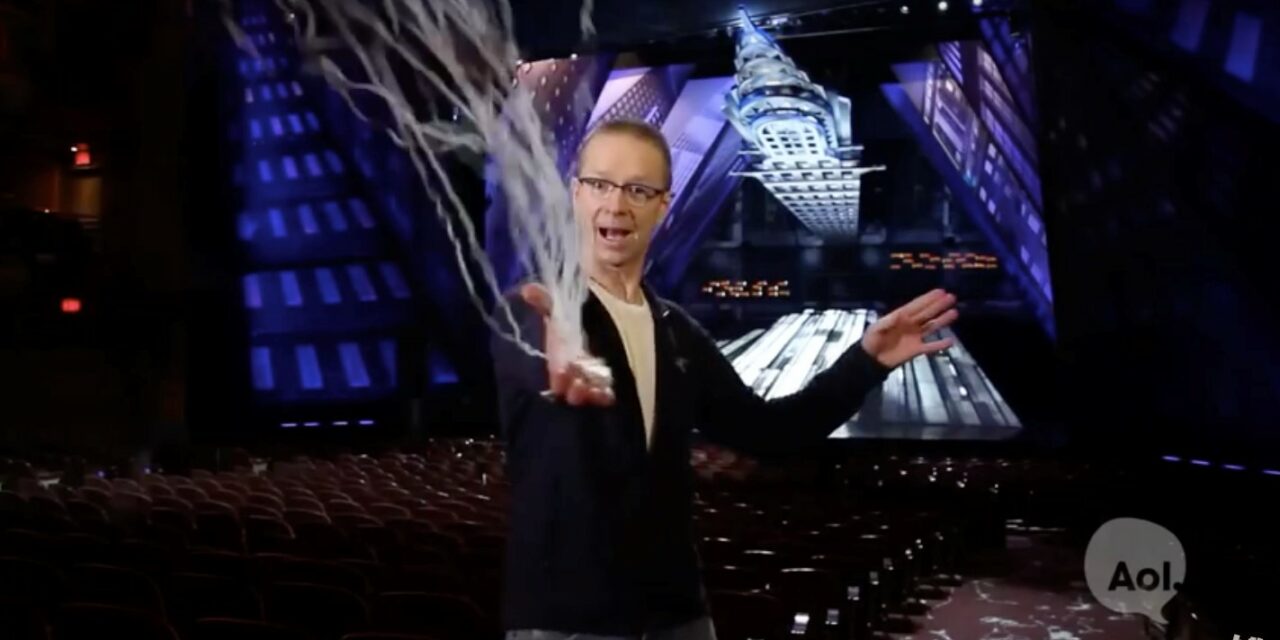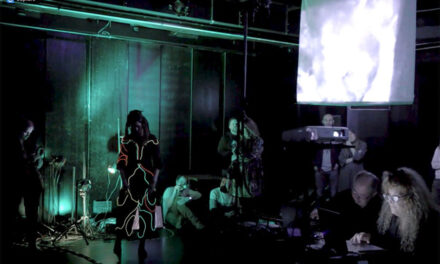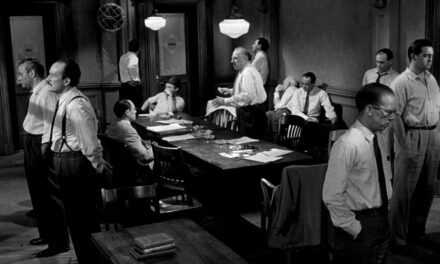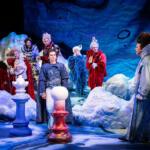A Stage Management Superhero
Randall White is an exceptionally unique theatre creator, manager, and facilitator equipped with an extraordinarily extensive and diverse list of credits. Growing up as an outsider in Dayton, Ohio, White found comfort in his backstage work at Rock n’ Roll concerts. Then only sixteen, White would soon decide to attend the University of Cincinnati’s Conservatory of Music and discover the only place where he says he feels truly at home: the theatre.
Since then, White has toured both domestically and internationally for thirteen years, stage-managed primarily on Broadway and in Las Vegas, and worked alongside stars such as Bette Midler, Barbara Streisand, and Michael Jackson. Perhaps his more notable credit, however, is that of his position as Production Stage Manager and Flight Instructor of Spider-Man: Turn Off The Dark. There, White worked with a plethora of the industry’s most intelligent and visionary artists and engineers to create and implement brand new theatrical technologies.
A firm believer of paying it forward, White makes sure to honor all those who have helped him throughout his journey by passing along his wealth of knowledge to the next generation of theatremakers. I had the ultimate privilege of hearing about these adventures and insights first hand both during White’s visit to USC in March of 2017 and more recently as I conducted the following interview over the phone.
The following is an edited version of our conversation for clarity and succinctness.
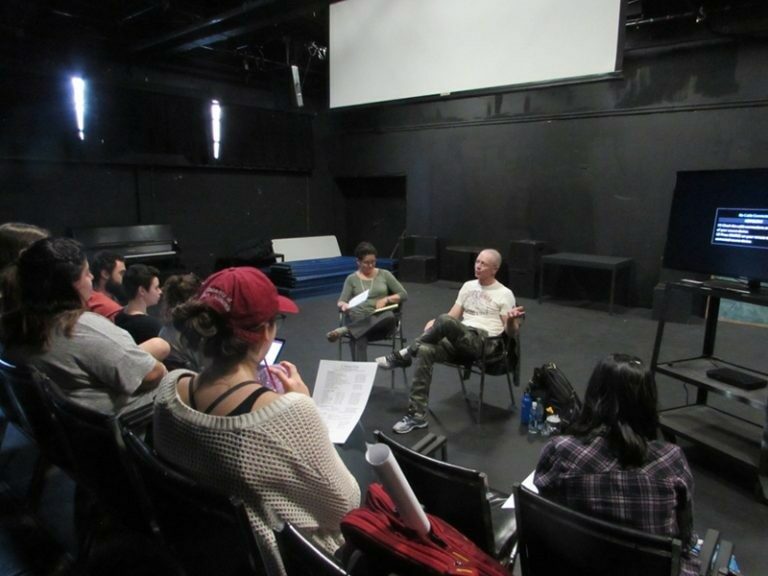
Spotlight@SDA Event – 2017, USC’s School of Dramatic Arts
Jamie Salinger (JS): What was it that motivated you to commit to the field of Production Stage Management?
Randall White (RW): It was really the only place in the world where I fit in. I felt very awkward as a kid and I wasn’t very social, but when I found theatre, it was just home. I knew it was a place I could feel comfortable and belong so I stuck with it.
JS: Who were some of your role models within the industry that you looked up to at that time?
RW: I never looked at any one individual and said, “Oh my god, that’s what I want to do” or, “That’s who inspires me.” I had some people who really helped me along the way, but I didn’t aspire to do exactly what they were doing. In the beginning, I just thought, “Okay, this is a place where I can go to work, have fun, and not have to wear a suit and tie. I don’t have to be there first thing in the morning and I get to work late at night…and everybody is weird!” So while there were people who helped guide my career, everyone I’ve met has just always said, “You are different from everyone else.”
JS: What do you think are some of the most beneficial technological advancements that have occurred in theatre throughout your career?
RW: Well automation has definitely improved. It originally became more common because it’s just stronger and cheaper than stage hands. So, immediately it was taking jobs that humans had because an automated piece of scenery is going to operate at exactly the same speed and end up in exactly the same place every single time. When you have a man pulling a rope or pushing a stick on his own, the timing is going to be different every time. Automation is just cheaper and better.
JS: Can you speak to the methods used to implement new theatre technologies, such as that of those during Spider-Man?
RW: Well four-point flying systems [theatrical rigging systems which allow actors to fly both vertically and horizontally] had already been introduced and they could move you anywhere around the room in any pattern you wanted. They had never previously been able to give the impression of swinging like Spider-Man requires, though. So the team needed to come up with a way to not only move these guys around the room exactly where they wanted them, but to also have pendulum. Something new needed to be created and that was done by Fisher Tech. Scott Fisher and I first worked together in 1994 before Scott had even developed his company. Scott is just truly a genius. He developed the software, built his own winches, wrote the code, got his own computer parts, and built the whole thing from scratch…and patented it! He came up with the best flying system the world had ever seen. It was the most accurate, the most intricate, the fastest, and it had the best winches. So when they first interviewed me about Spider-Man, I said, “Who’s your flying company because it needs to be Fisher Tech.” It was. I took the job and to figure out the pendulum swings, they actually worked for two and a half months on filming lots in LA trying to program what they envisioned for the show. Eventually, we went through twelve versions of flying rigs before we got to the final one. It’s a lot of physics and the weight at the end of the line effects how far it swings. So, once we spent hundreds of hours programming and developing the system with the original guinea pig who weighed 170 pounds, we were locked into that weight. We had a ten-pound window, but that was it. All of the future casting for that particular track required them to weigh between 165 and 175 pounds. If you weighed under 165 you came in short and if you were over 175 you overshot…and we were landing on something that was only 4 feet by 2 feet deep!
JS: What is your process like as you continue working on such exceedingly complex productions and overcoming the challenges associated with them?
RW: Well it wasn’t so much an adrenaline rush sort of thing. What I was really good at was the technical end of theatre and calling shows that had a lot of scenery because I somehow had a brain that could see three-dimensionally. If you show me a model of a set and tell me how you want it to function, it makes perfect sense to me. I think I could’ve been in air-traffic control because I can visualize what’s going on within each plane. So, I know how to keep everything in the air from running into each other while still having each piece do what it needs to be doing. In the beginning, the computers couldn’t talk to each other as much as they can now. If you had two pieces of heavy scenery being operated from different computers, it was up to you to make sure that they didn’t collide. So the biggest and best challenge was keeping all of that information in my book and in my head. I had to know exactly what was going to move and how every time I said, “Go.” The other part of my brain then also needed to be listening to the music, making sure the actors were in the right place, and making all of the quick decisions that go along with that. That’s the really exciting part for me.
JS: What do you think has been the most fulfilling project that you’ve worked on thus far?
RW: Well I really liked the flying on Spider-Man because I was the flight instructor…by default. When we started, I said, “I can be the flight instructor If you want me to be” and they all thought that was ridiculous. What happened was, once we were in rehearsals and into previews, all the actors came to me when they were confused or their flights weren’t working. So, they ended up giving me the responsibility and the title. It required a tremendous number of working hours, but I really enjoyed that part of the job. Some of my most fulfilling shows, though, were the ones that failed. There were truly great rides with everyone working together to mount the show. The Pirate Queen [Fall 2006–Summer 2007] was a great task. We had a lot of fun. We also had some accidents, but it bonded us all together and the show closed 6 weeks after it opened on Broadway. It didn’t matter, though. It’s still one of my favorites. The success of a show doesn’t dictate how you feel about it or how much it fulfills you.
JS: What do you think has been the biggest difference between your work in New York City and your work in Las Vegas?
RW: What I always used to say is that Vegas knows how to run a show, but not so much how to mount a production. Back in the day when the hotels were the producers of the shows and everybody in the theatre was a hotel employee, that’s when it was weird. It was just a very different protocol with how you put the show together and who’s in charge of what. In Old Vegas, the company manager was the enforcer of all the rules, whereas on Broadway there are equity rules that would be the job of the Production Stage Manager to enforce. So, in Vegas, I didn’t have to do any of that. I just had to be the show caller. I didn’t have to do the rehearsal schedule. I didn’t have to take care of the actors or do discipline or enforce the rules. I just walked in, called my show, and walked out. That’s how Rock n’ Roll is too. You don’t take care of the dancers, make the schedule, or even work the load in or load out.
JS: What work have you engaged in internationally?
RW: The first time I ever worked in a foreign country, I was hired to install a lighting system for a cruise ship in a German shipyard. At the time, I was working for a company that installed sound and lighting systems so we went over there and then I stayed on as the theater electrician. I also did Starlight Express in Germany and that was my first Production Stage Management title. It was 1988. Then I went to Japan for Starlight Express. Later on, I did an Andrew Lloyd Weber concert tour and the a few other world tours.
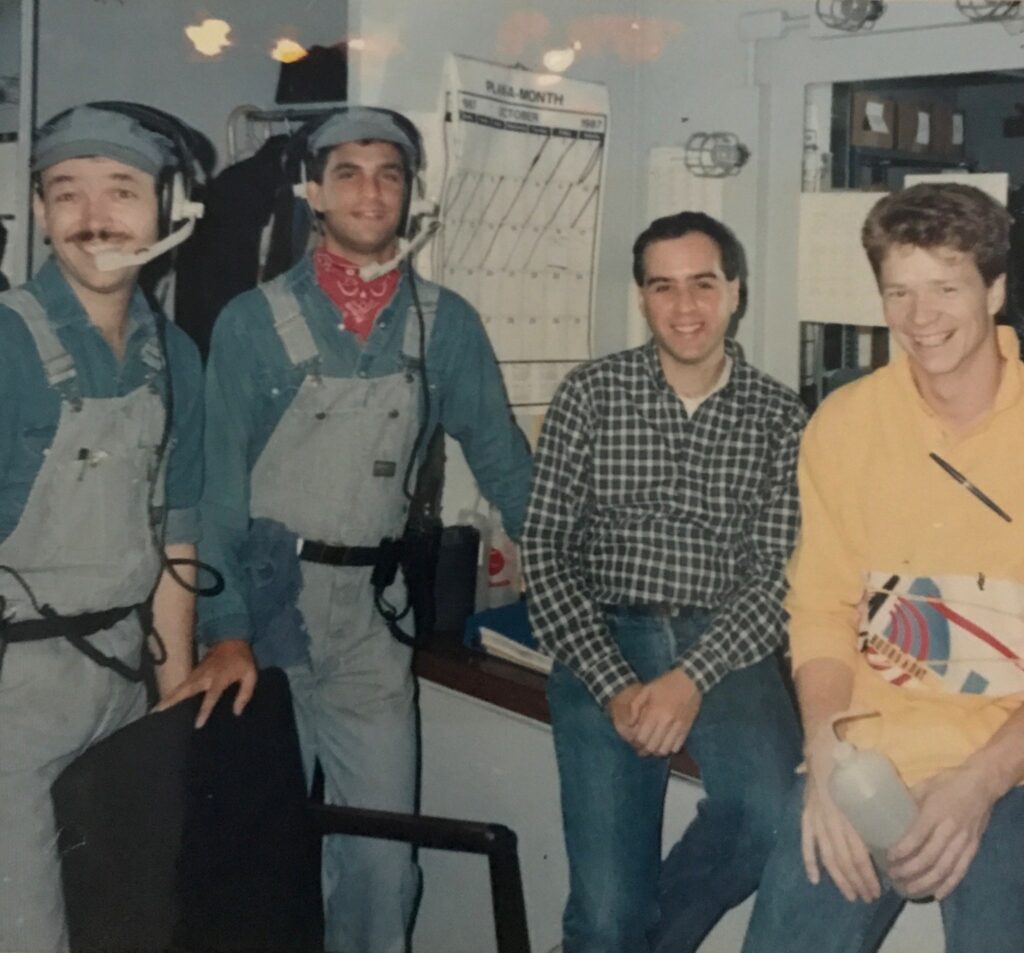
Starlight Express (1988) – Photo Taken by Bonnie Panson
Left to Right: Clayton Phillips, Michael Passaro, Perry Cline, Randall White
JS: What are your hopes for the next generation of theatre artists and technicians? Do you think we’re heading in a positive direction?
RW: Well, I will say that I have a little bit of a problem with the lack of respect from upper-management and Directors toward Stage Managers. Directors don’t seem to respect the position of a Stage Manager nearly as much as they used to. I also think that some of the younger people coming up don’t have the personal integrity that they need to have to stand up against being abused by upper-management and Directors. They ask us to do things that are not our job and people are willing to do it because they think that they have to. You can stand up and say, “That’s not part of my job description. I don’t do that. Have someone else or another department take care of it.” It’s a big problem in our industry. Equity rules have helped a little, but I really hope that that continues to improve. It is just a very tough business. You’re only as good as your last gig and you have to be willing to not only do the work, but to speak up when things aren’t right. I think a good change that’s happening now, though, is that established Stage Managers are stepping in to protect their actors. Anybody who is in a cast that I am in charge of is under my protection and if something wacky is going on, I am the first one to stand in front of them and say, “No, that’s not right.” It’s harder to do that when you’re just up and coming in the business, but it’s happening much more now than in the 80’s and 90’s.
JS: Is there any additional advice you would like to share with young theatre makers?
RW: If making your living in theatre full-time is really what you want to be doing, there is a lot of sacrifice that goes into just running shows. There are so many jobs in entertainment where you can work and live in one place and have a life. I just felt the most comfortable in the theatre running shows, so that’s what I wanted to do. In order to do that, I had to move where the work was no matter when. I had to stay light. There are times when you’re unemployed and it’s a hard road. You have to be willing to travel. Once, I was on my way out the door heading to Chicago to do an industrial and the phone rang. Someone wanted me in Hong Kong at the end of the week. They booked me a flight from Chicago to Hong Kong and I just threw a few more clothes in my bag and left. You just have to be willing to do what it takes to get those jobs and do them well. It’s led me down a path of a very interesting life.
This post was written by the author in their personal capacity.The opinions expressed in this article are the author’s own and do not reflect the view of The Theatre Times, their staff or collaborators.
This post was written by Jamie Salinger.
The views expressed here belong to the author and do not necessarily reflect our views and opinions.

